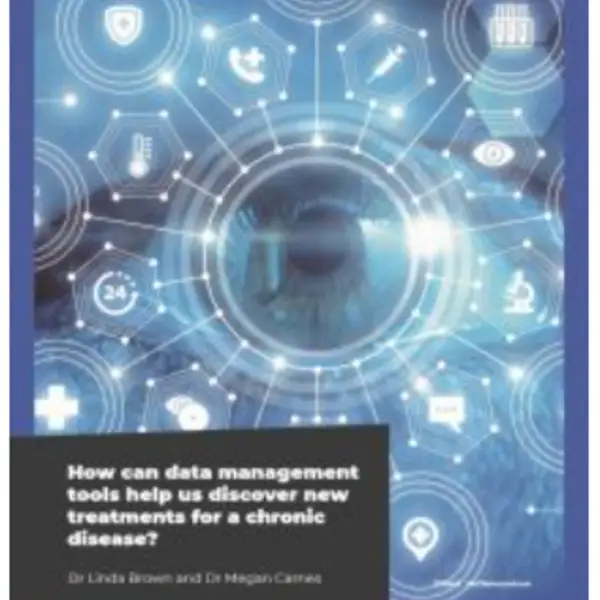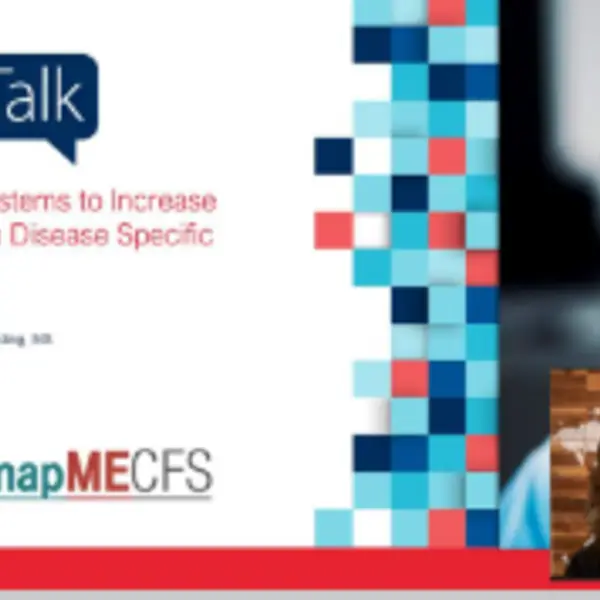
This article was produced by Futurum Careers, a free online resource and magazine aimed at encouraging 14-19-year-olds worldwide to pursue careers in science, tech, engineering, maths, medicine (STEM) and social sciences, humanities and the arts for people and the economy (SHAPE). For more information, teaching resources, and course and career guides, see www.futurumcareers.com. This article was originally published on Futurum Careers on October 31, 2023.
Myalgic encephalomyelitis/chronic fatigue syndrome (ME/CFS) is a complex disease that can take a huge toll on a person’s everyday life. There is still much we do not know about the disease, and researchers are working hard to learn more about what causes it. Dr. Linda Brown, an epidemiologist, and Dr. Megan Carnes, a genomics research scientist, from RTI International in the US have developed a suite of data management tools to help ME/CFS researchers to collaborate in the hope of finding new treatments.
Sometimes, when we are ill or overworked, we wake up feeling as though we have not slept a wink. If you have had a bad night’s sleep, it can take all your energy to open your eyes and get out of bed. At times like these, the thought of having to go to school or work can seem impossible.
Luckily, for most of us, these days are few and far between, and, although we may never get used to an early alarm clock, we are able to get up and tackle whatever the day has in store for us. For people with myalgic encephalomyelitis/chronic fatigue syndrome (ME/CFS), daily life is far more difficult. ME/CFS is a serious, long-term illness that can change a person’s life completely, leaving them unable to do things that most of us take for granted, including going to school or work, taking a walk, or even getting out of bed.
People with ME/CFS have extreme fatigue and find it difficult, or even impossible, to get a good night’s sleep. They may develop problems with their memory and ability to focus. They may also have debilitating and unbearable pain and dizziness. These symptoms are associated with post-exertional malaise (PEM), when the brain and the body cannot recover from even tiny amounts of activity.
ME/CFS can affect anyone, no matter their age, gender or ethnic background. However, women are two to four times more likely to be diagnosed with ME/ CFS than men. It is estimated that almost 17 million people around the world have ME/CFS; however, it is likely that many more people remain undiagnosed.
One of the biggest problems with ME/CFS is that we do not know what causes it. Researchers, medical professionals, and scientists all over the world are trying to understand what triggers the disease so that new treatments can be developed. To do this, researchers need access to as much data about ME/ CFS as possible.
Dr. Linda Brown and Dr. Megan Carnes work at RTI International, a non-profit research institute that is dedicated to improving the quality of people’s lives. They are working with a team of researchers to develop new data-sharing tools that will allow more collaboration and communication between ME/CFS researchers, medical professionals and people with ME/CFS.
Collaboration and data sharing
Encouraging researchers and medical professionals to share data and store them in centralised, easily accessible databases makes collaboration much more effective. Sharing data and encouraging collaboration can advance ME/CFS research by enabling researchers to better validate their results, reuse data that is difficult to generate, and perform stronger analyses by combining datasets. “By promoting communication between ME/CFS clinicians and researchers, we hope to accelerate future research,” says Linda.
Current research
“A number of institutions and organisations around the globe are undertaking innovative basic and clinical research,” says Linda. Some of this research focuses on finding the causes of ME/CFS and how it develops and changes over time. Other researchers are studying the different subtypes of ME/CFS and their different symptoms. However, most current research is focused on identifying potential treatments for ME/CFS. No matter what the focus of the research, access to data is very important.
A scientific community
In 2017, the US National Institutes of Health (NIH) established the ME/CFS Collaborative Research Network. The goal of this network is to conduct basic scientific and clinical research to better understand the causes, symptoms and treatments of ME/CFS.
“A basic research project might characterise cellular and molecular mechanisms of disease processes, while a clinical research project might follow a group of people with ME/CFS and a comparison group of healthy people,” explains Linda. To support this research, the NIH supported RTI to set up a Data Management and Coordinating Center (DMCC), which helps the collaborative research centres manage their data.
“The DMCC supports research by providing administrative management and logistics, and expertise in data management and data analytics,” says Linda. The team of researchers at the DMCC has developed three tools which help to facilitate collaboration and communication in ME/CFS research.
The DMCC has created a website, called MECFSnet, which contains information about ME/CFS. The website has tools and other resources to help support people with ME/CFS and the researchers who are studying it. The team has also created searchMECFS, a tool that allows researchers to obtain biospecimens for their research, and mapMECFS, a data sharing tool.
mapMECFS
mapMECFS is the largest data repository for ME/CFS data and serves as a primary location for researchers to share the results they generate in their laboratories. Research that involves human subjects requires careful planning and ethical reviews, as well as participant briefings, enrolment and follow-up. As a result, these studies can be costly and take many years to complete.
“It is essential that researchers share the data they generate with the scientific community to maximise what can be learned from each study,” says Megan. mapMECFS allows researchers to access data from the latest research and use data from other studies to inform their own research.
“As a subject matter expert, my job is to understand the needs of the researchers, including their data and its complexity, and to translate those needs so the software developers can create new tools,” explains Megan. These tools include a data explorer which can, for example, allow researchers to search for a gene of interest and find the studies that have investigated that gene. “We also developed a data integration tool that allows researchers to quickly merge clinical data files,” says Megan.
The next steps
mapMECFS will continue to grow as researchers upload data. “The development of mapMECFS is ‘user-centred’, which means that we prioritise site changes based on the feedback we receive from researchers using the site,” says Megan.
The needs of the researchers will determine how mapMECFS changes in the future. Megan expects that the team may create new data visualization tools, increase the amount of data that the site’s integration tool can process, and improve the site’s ability to check the quality of the data. “The overall goal of this work is to make scientific data more accessible,” she says. Linda and Megan hope that their work will continue to support researchers with the goals of understanding the biology of ME/CFS and developing new treatments.
Cite this article: https://doi.org/10.33424/FUTURUM436





